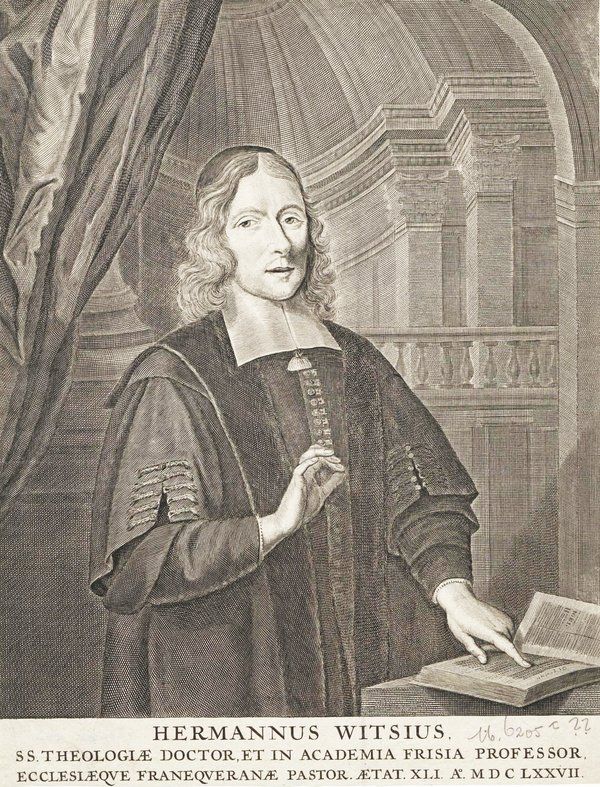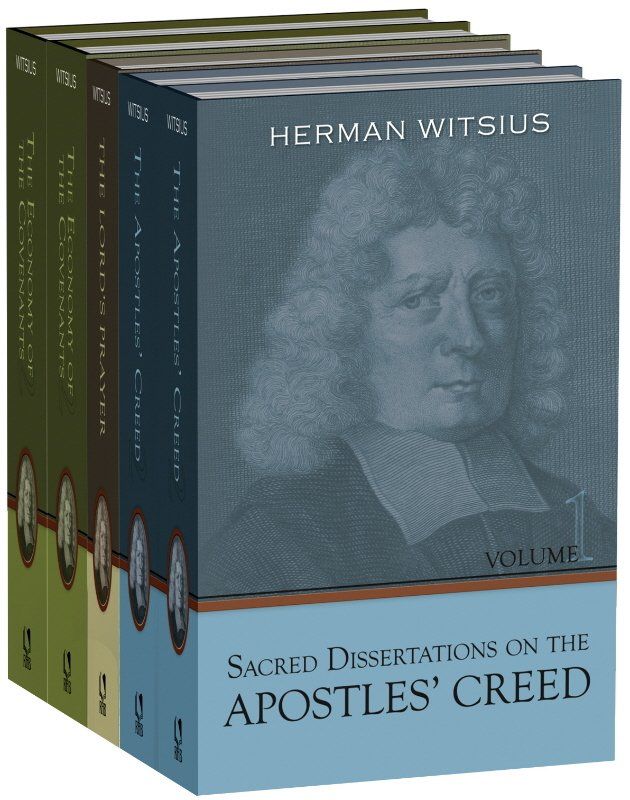
There has always been two ways of viewing God in relation to man. He is seen by some as the God of order, ruling his universe with standard which reflect his eternal nature and which are revealed through the Scripture and which are demanded of man. What man cannot do to keep God’s covenant with Adam and his off-spring, God accomplishes in his covenant with Christ and his church.
Others see God as acting according to the impulse of the moment, though this leads to completely paradoxical actions. He is a God of contingency, arbitrariness and caprice.
The former view was certainly held by the New Testament authors, our Reformers, the Puritans and the leaders of the Evangelical Awakening. The second view was, and still is, held by those such as anti-Calvinist Hugo Grotius (1583-1645) who maintain that God is not bound by himself and that even the Mosaic Law and God’s entire plan of salvation as revealed in both Testaments are temporary devices to accomplish transient aims, leaving man with as little true knowledge of God as ever before.
Those who believe that God never changes show how Scripture teaches that God has covenanted with his Son to seek out a people for himself who will become partakers of his divine, perfect, unalterable and eternal nature. It became the life’s work of Hennan Witsius (1636-1708) of Enkhuysen, Holland, to explain to his fellow men how God does this.

Witsius was born of believing parents who committed their son to God before his birth. When the puny infant arrived prematurely, the midwives predicted that he would not survive more than a few hours. Mr and Mrs Witsius prayed in faith, promising to bring their child up in the nurture and admonition of the Lord. He survived to become one of the greatest men of God and men of letters that Holland has ever produced.
Young Herman learnt to pray, read and write at a very early age before being sent to a Latin school when five years old. His learned uncle, Peter Gerhard, then took him on as a private pupil and prepared him for university entrance. Gerhard taught Herman history, Dutch, French, Latm, Greek, Hebrew and science and instilled in the boy a love for the Bible.
Because of his proficiency in knowledge, Witsius was accepted by Utrecht at the early age of fourteen. His professors confessed in wonder that there was not much they could teach hunt Herman however, knew that there was one thing still lacking in his education and deepened his biblical studies. Though taught of God from early childhood, it was as a student that he came to an experimental knowledge of salvation. When one reads that Hoornbek, Voetius and Bogaerdtius were Witsius’ professors, one can understand what a heaven on earth Utrecht must have been in those days.
At the age of nineteen, Witsius was set apart for the ministry and called to the French-speaking congregations in Holland. Two years later, in 1657, he was invited to pastor the Reformed church at West Wouden where he remained for four years. Meanwhile Witsius’ treatise on the Trinity had found European acclamation and he was preaching and lecturing throughout Holland, becoming immensely popular for the gospel’s sake. Especially children and young people were led to the Lord by this highly academic man who could put divine truths into simple words that even the youngest understood
In 1660 Witsius married Aletta van Borchorn, a merchant’s daughter who always said she did not know which was the greater, her love for her husband or her respect for him. The couple had two sons who died early and three daughters. Aletta served the Lord at her husband’s side until her death in 1684 after a long and painful illness in which she displayed her deep trust and joy in the Lord.
In 1661, Witsius accepted a call to one of Holland’s largest churches at Wormeren, a church sadly split into a dozen factions. Witsius’ preaching merged them all into one flock and when unity was achieved, he was called to do a similar work in Leuwarden, the capital of Friesland, in 1668.
1668 was the year of the Triple Alliance when the United Dutch Provinces allied with Sweden and England. Dutch believers saw the alliance as a bulwark against Spain and France, the pope’s two grasping hands for the Protestant pearl of the United Provinces. When the War of Independence broke out in 1672, Witsius was amazed to find that England, the land of the Puritans, had turned tail and, under Charles II, was supporting Louis XIV of France against the United Provinces.

The brave Protestant Dutch swore that they would never bow the knee to a Roman power and prepared to break all their dykes and swamp the entire provinces, sailing off to found a new Christian state in the East Indies. The Lord of providence planned otherwise. Just as the Netherlands were about to be trodden underfoot, William of Orange was raised up to save the Dutch from disaster and the English from shame and both Holland and England from a papal take-over.
In 1675 Witsius gained his doctor’s degree and was called to the Chair of Theology at Franeker University. So great was his fame that when he delivered his investment lecture on De vero theologo, he found that an enormous crowd of people had traveled from every corner of the province to hear him.
It was at this time that Witsius realized that God had given him the gifts and the authority to use his pen against the joint enemies of Dutch Protestantism, i.e. Rorne and those Dutch Protestant theologians who, with Grotius, had rejected a sola scriptura theology in exchange for an institutionalized, sacramental view of the church based on tradition which they called the pia antiquitas and which paved the way back to Rome.
Witsius also directed his pen against Socinianism on the one side of Grotianism and Arminianism on the other, arguing that they were public adversaries of biblical truths who had ‘defiled the doctrine of God’s covenants’ and thus it was ‘absolutely necessary to oppose them’.
More dangerous than the Socinians and Arminians in Witsius’ eyes were the Grotians. Using and misusing the language of biblical theology, they spoke of a Law which was not the Law of Moses, a Satisfy action which was not through punishment and a Substitution which was not of necessity and not vicarious. Thus one of the first products of Witsius’ professorship was his monumental work on the Economy of the Covenants which, next to Calvin’s Institutes, has proved to be one of the main exegetical pillars of biblical theology and indeed biblical evangelism.
Thanks to Thomas K Ascol and James L Packer, the eighteenth-century translation published by John Gill and his circle has been recently made available in a two volumed, bound edition which will prove a Godsend to all who feel called to witness for God to their fellow men.
James Hervey was sent the Gill edition by John Ryland Sen, in February 1753 and replied, ‘I received your obliging letter, and very valuable present of Witsius, which I shall thankfully keep as a monument of your friendship, and attentively study as a magazine of evangelical wisdom. May the Lord Jesus Christ transfer the precious truths from the writer’s pen to the reader’s heart!’ Hervey did indeed experience that transfer and wrote later to another friend concerning the work, ‘I wish, for my own sake, that you were somewhat acquainted with the author, because, if you should be inclined to know the reason and foundation of my sentiments on any particular point, Witsius might be my spokesman; he would declare my mind better than I could do myself.’

In his famous work Thereon and Aspasio, Hervey calls Witsius’ work ‘the golden pot which had manna; and was outwardly bright with burnished gold; inwardly rich with heavenly food’.
Though Witsius wrote a number of Christian bestsellers such as his books on the Apostles’ Creed and the Lord’s Prayer, his work on the covenants drew students to sit at his feet from all parts of the world and he was able to persuade the cream of these students to take up teaching posts in the Dutch universities.
After finding a worthy substitute for himself in John March at Franeker, Witsius accepted a call to Utrecht University where, as in Franeker, he took over the Chair of Divinity (after the death of Professor Burmann) and pastored the local church. His investment discourse De Praestantia Veritatis Ewngelicae made it quite clear that Witsius was going to stress the evangelical app1ication of academic work.
Again, Witsius soon built up a solid core of evangelical, Reformed pastors and teachers around him an his lectures were not only visited by bis students but also by the bulk of the teaching staff from every faculty of the university.
Witsius’ energies were enormous. He would spend his days teaching, his evenings preaching and his nights studying, writing and preparing so that his friends affirmed that he never slept at all. Even when middle aged, Witsius is known to have often worked through several days and nights without a wink of sleep.
It was no wonder that Witsius’ fame led in 1685 to his being sent as a leading member of a Dutch delegation to the court of James II of England, whom the Dutch wished to impress with the Reformed faith During the months Witsius spent in England he pleased all denominations by treating both Anglicans and Dissenters on equal terms and had sweet fellowship with evangelicals of both parties. He was made Chancellor of Utrecht University in 1686.

Now Witsius gained a personal friend in William of Orange and was able to influence him strongly in gospel matters. In 1698 William asked Witsius as a personal favour to take over the Chair of Divinity at Leyden. Old age was now rapidly taking its toll on Witsius’ health as he had never spared himself and he felt he should obey the call and now concentrate on preparing men for the ministry, giving up pastoral work.
A year later, Witsius was elected Regent of a theological college set up by the Dutch States and West Friesland, and again Witsius found himself with a dual burden as Leyden begged him to stay. Though Witsius was rapidly fading from this world, his fame was still growing and seekers after righteousness and true learning flocked to him from all the Dutch States, France, Germany, England, Poland, Switzerland and Eastern Europe. Even Native Americans, converted through the work of Eliot (1604- 90) and those who followed him, found their way to Leyden to be trained for the ministry.
Death was not tender to Witsius. His last six years were spent in acute pain and dizziness. He suffered from severe memory lapses and at times he quite lost his powers of thought. After a serious attack in October 1708, Witsius told those at his side that his home call had come. He spent the last hour of his life speaking of his blessed hope and heavenly joys before peacefully closing his eyes to be awakened in Glory





